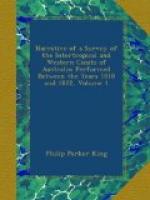This event collected the whole tribe to the spot, who assisted in landing their prize and washing the sand off the body; they then carried the animal to their fire at the edge of the grass and began to devour it even before it was dead. Curiosity induced Mr. Cunningham and myself to view this barbarous feast and we landed about ten minutes after it had commenced. The moment the boat touched the sand the natives, springing up and throwing their spears away into the bushes, ran down towards us; and before we could land had all seated themselves in the boat ready to go on board, but they were obliged to wait whilst we landed to witness their savage feast. On going to the place we found an old man seated over the remains of the carcass, two-thirds of which had already disappeared; he was holding a long strip of the raw flesh in his left hand, and tearing it off the body with a sort of knife; a boy was also feasting with him and both were too intent upon their breakfast to notice us or to be the least disconcerted at our looking on. We however were very soon satisfied and walked away perfectly disgusted with the sight of so horrible a repast, and the intolerable stench occasioned by the effluvia that arose from the dying animal, combined with that of the bodies of the natives who had daubed themselves from head to foot with a pigment made of a red ochreous earth mixed up with seal-oil.
We then conveyed the natives, who had been waiting with great patience in the boat for our return, to the vessel, and permitted them to go on board. Whilst they remained with us Mr. Baskerville took a man from each mess to the oyster-bank; here he was joined by an Indian carrying some spears and a throwing-stick, but on Mr. Baskerville’s calling for a musket that was in the boat (to the use of which they were not strangers) he laid aside his spears, which probably were only carried for the purpose of striking fish, and assisted our people in collecting the oysters. As soon as they had procured a sufficient quantity they returned on board when, as it was breakfast time, our visitors were sent onshore, highly pleased with their reception and with the biscuit and pudding which the people had given them to eat. They were very attentive to the mixture of a pudding, and a few small dumplings were made and given to them, which they put on the bars of the fireplace but, being too impatient to wait until they were baked, ate them in a doughy state with much relish.




